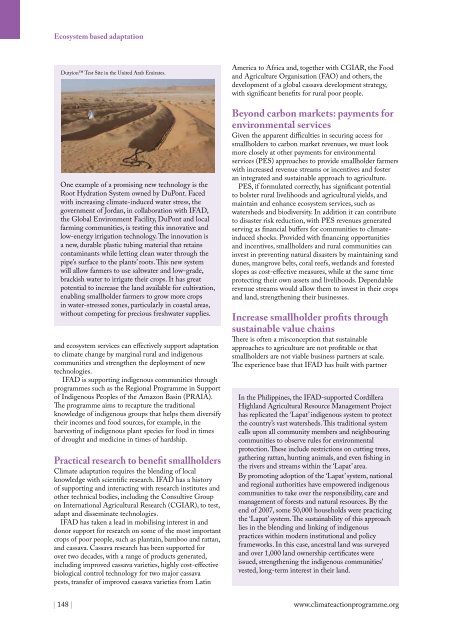Climate Action 2010-2011
You also want an ePaper? Increase the reach of your titles
YUMPU automatically turns print PDFs into web optimized ePapers that Google loves.
Ecosystem based adaptation<br />
Dutyion Test Site in the United Arab Emirates.<br />
One example of a promising new technology is the<br />
Root Hydration System owned by DuPont. Faced<br />
with increasing climate-induced water stress, the<br />
government of Jordan, in collaboration with IFAD,<br />
the Global Environment Facility, DuPont and local<br />
farming communities, is testing this innovative and<br />
low-energy irrigation technology. The innovation is<br />
a new, durable plastic tubing material that retains<br />
contaminants while letting clean water through the<br />
pipe’s surface to the plants’ roots. This new system<br />
will allow farmers to use saltwater and low-grade,<br />
brackish water to irrigate their crops. It has great<br />
potential to increase the land available for cultivation,<br />
enabling smallholder farmers to grow more crops<br />
in water-stressed zones, particularly in coastal areas,<br />
without competing for precious freshwater supplies.<br />
and ecosystem services can effectively support adaptation<br />
to climate change by marginal rural and indigenous<br />
communities and strengthen the deployment of new<br />
technologies.<br />
IFAD is supporting indigenous communities through<br />
programmes such as the Regional Programme in Support<br />
of Indigenous Peoples of the Amazon Basin (PRAIA).<br />
The programme aims to recapture the traditional<br />
knowledge of indigenous groups that helps them diversify<br />
their incomes and food sources, for example, in the<br />
harvesting of indigenous plant species for food in times<br />
of drought and medicine in times of hardship.<br />
Practical research to benefit smallholders<br />
<strong>Climate</strong> adaptation requires the blending of local<br />
knowledge with scientific research. IFAD has a history<br />
of supporting and interacting with research institutes and<br />
other technical bodies, including the Consultive Group<br />
on International Agricultural Research (CGIAR), to test,<br />
adapt and disseminate technologies.<br />
IFAD has taken a lead in mobilising interest in and<br />
donor support for research on some of the most important<br />
crops of poor people, such as plantain, bamboo and rattan,<br />
and cassava. Cassava research has been supported for<br />
over two decades, with a range of products generated,<br />
including improved cassava varieties, highly cost-effective<br />
biological control technology for two major cassava<br />
pests, transfer of improved cassava varieties from Latin<br />
America to Africa and, together with CGIAR, the Food<br />
and Agriculture Organisation (FAO) and others, the<br />
development of a global cassava development strategy,<br />
with significant benefits for rural poor people.<br />
Beyond carbon markets: payments for<br />
environmental services<br />
Given the apparent difficulties in securing access for<br />
smallholders to carbon market revenues, we must look<br />
more closely at other payments for environmental<br />
services (PES) approaches to provide smallholder farmers<br />
with increased revenue streams or incentives and foster<br />
an integrated and sustainable approach to agriculture.<br />
PES, if formulated correctly, has significant potential<br />
to bolster rural livelihoods and agricultural yields, and<br />
maintain and enhance ecosystem services, such as<br />
watersheds and biodiversity. In addition it can contribute<br />
to disaster risk reduction, with PES revenues generated<br />
serving as financial buffers for communities to climateinduced<br />
shocks. Provided with financing opportunities<br />
and incentives, smallholders and rural communities can<br />
invest in preventing natural disasters by maintaining sand<br />
dunes, mangrove belts, coral reefs, wetlands and forested<br />
slopes as cost-effective measures, while at the same time<br />
protecting their own assets and livelihoods. Dependable<br />
revenue streams would allow them to invest in their crops<br />
and land, strengthening their businesses.<br />
Increase smallholder profits through<br />
sustainable value chains<br />
There is often a misconception that sustainable<br />
approaches to agriculture are not profitable or that<br />
smallholders are not viable business partners at scale.<br />
The experience base that IFAD has built with partner<br />
In the Philippines, the IFAD-supported Cordillera<br />
Highland Agricultural Resource Management Project<br />
has replicated the ‘Lapat’ indigenous system to protect<br />
the country’s vast watersheds. This traditional system<br />
calls upon all community members and neighbouring<br />
communities to observe rules for environmental<br />
protection. These include restrictions on cutting trees,<br />
gathering rattan, hunting animals, and even fishing in<br />
the rivers and streams within the ‘Lapat’ area.<br />
By promoting adoption of the ‘Lapat’ system, national<br />
and regional authorities have empowered indigenous<br />
communities to take over the responsibility, care and<br />
management of forests and natural resources. By the<br />
end of 2007, some 50,000 households were practicing<br />
the ‘Lapat’ system. The sustainability of this approach<br />
lies in the blending and linking of indigenous<br />
practices within modern institutional and policy<br />
frameworks. In this case, ancestral land was surveyed<br />
and over 1,000 land ownership certificates were<br />
issued, strengthening the indigenous communities’<br />
vested, long-term interest in their land.<br />
| 148 |<br />
www.climateactionprogramme.org












